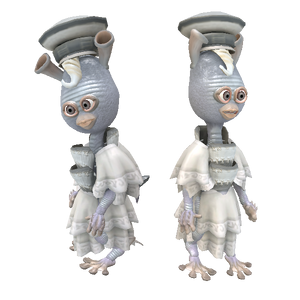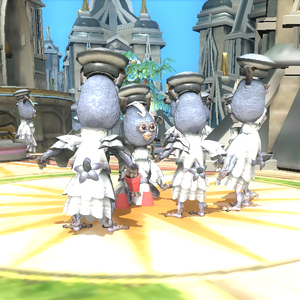|
This fiction is still under construction. Unlike {{work}}, this means that the original creator(s) of the page is still intending to finish it. |
“Vanquishers of the brutal past, wielding boons of the benevolent future. They of the Xaela Isles inspire movement in the inert present.”
- - Aezal explorer
The Xaela'qu League commonly called the Xaela'qu, is a rapidly-industrializing commercial and defensive confederation of J'si city-states (de jure) on the Xaela Isles in the Northern Seas. Growing from a temporary defense pact created to protect J'si interests in the world at large, the Xaela'qu eventually came to dominate trade in the Boreal Seas region of Narazen.
Collectively, the Xaela'qu cities have a complex legal system based on the inalienable rights to life, liberty, and property, and operate their own armies for mutual protection and aid. Despite this, the organization is not a state (per se), nor could it be (in practice) called a confederation of city-states, but rather the Xaela'qu is best described as a sort of plutocratic oligarchy comprised of free merchants, corporations, and guilds banded together in the name of enlightened self-interest.
History
Origins
Circa 5,000 Years Ago From time immemorial, it seems as if the Proto-J'si have been enslaved to the cruel wills of their A'jsai masters. The A'jsai were a wicked species of sorcerers who, in their malice and hubris, tried to use vile magics of Chaos to usurp the powers of their gods. The leader of their pantheon, the benevolent yet crafty volcano god Dath'eloih, justly ruled that the civilization of the A'jsai must fall for their sins, and devised a plan. Dath'eloih looked upon the slave castes of the A'jsai society, and in his wisdom granted them the divine flames of sapience. Within months the slave castes, now calling themselves the "J'si" in mockery of their former masters, threw off their chains and destroyed the A'jsai civilization, casting the remnants out of the Xaela Archipelago. However, the J'si still had much to learn, and for many years the Volcano God taught the J'si the arts of civilized living: writing, agriculture, the usage of fire, etc. The J'si are also taught the moral laws of the pantheon, to love thy neighbor and embrace all in a spirit of dignity and brotherhood.
Circa 1,250 Years Ago The J'si have become truly civilized beings; the art of statecraft becomes refined by the emergence of city-states. The moral laws of the gods are honored, and in return the Volcano God and co. protect the J'si from malign outsiders, like good parents watching over an obedient child. However the Xaela Isles, despite a flourishing of culture among the J'si, are thus isolated from the other peoples of the Boreal Seas. The first major irrigation and transportation canals begin construction around this time.
625 Years Ago The Xaela Isles make first contact with the outside world. A sense of mercantilism develops among the city-states, and they grow splendidly wealthy as a center of trade among the civilized peoples of the Boreal Seas. The first "industrious revolution" begins as gunpowder weapons begin to proliferate.
320 Years Ago The seven largest and most prosperous cities unite as a confederation under the Unification Accords, and thus the Xaela'qu League is born; in time the entirety of the Xaela Archipelago would fall under the dominion of the League.
Current Events
160 Years Ago J'si alchemists and wizards discover how to bind lesser elementals in such a manner as to generate useful work. The second "industrious revolution" begins, fueled by the powers of elemental magics.
80 Years Ago At the break of dawn of the spring equinox, the Xaela Isles are invaded by the feared reptilian marauders known as the Daiuk-hro; in an unprecedented turn of events however, the Xaela'qu push back the invaders through heavy firepower (i.e. alchemically-enhanced firearms and explosives) and aerial superiority using the newly invented dirigible balloon.
40 Years Ago The "Golden Age of the Xaela'qu" begins; annual quality of life indexes are higher than ever before, and the Xaela'qu League is the dominant economic power in the Boreal Seas. New inventions are becoming ubiquitous as consumer culture grows ever larger. For in the noble brightness of the Xaela'qu, there is a brave new era of productivity and prosperity.
Geography
The Xaela Isles are very geologically active and this, combined with large amounts of rain and snow caused by the warm waters of the gulf stream currents which flow toward it, mean that many unusual geographic features have developed which make it different from any other archipelago so close to the northernmost regions of the world. Some of these features are numerous mountains, volcanoes, hot springs, rivers, marshlands, small lakes, waterfalls, glaciers, and geysers.
The Xaela Isles straddle the ridge which marks the boundary between tectonic plates. The ridge runs directly through some of the most populated and historic areas on the archipelago, and the tectonic activity of these plates separating is the source of the abundant elemental spirits, and in particular fire elementals, in the region which have fueled industrial development.
WORK IN PROGRESS
Demographics

A typical J'si citizen in typical Xaela'qu garb
The most common sapient species in the League is, of course, the J'si; 95% of the population is comprised of J'si. The J'si are amphibian theriocephali (beast-folk) with elongated craniums and rapid metabolisms that enable them to possess quick reflexes and quicker wits at the cost of miniscule maximum lifespans of 40 to 60 years. However, the Xaela'qu doesn't legally discriminate against members of other species, with equality under the law being a sacred tenet of the League Constitution.
WORK IN PROGRESS
Government
The city-states of the Xaela Isles are a diverse bunch, and just because the League as a whole functions as a plutocratic oligarchy, doesn't mean that constituent city-states are uniformly plutocratic in nature. In fact, of the seven founding members of the league, four were (and still are) direct democracies.
Generally, the required qualifications for citizenship in said direct democracies are that one must be an adult (In J'si, this means ~ 10 years old) and an owner of significant property (land or capital); the assemblies of these city-states typically meet two-hundred times per year, and all citizens are required to attend. All decisions concerning the running of the city-state in question are decided here – taxes, war, policy, etc. Any decisions are thus made by secret ballot. Before the deliberations began a religious rite is performed, oft involving gunpowder fireworks which the J'si view as sacred.
Matters concerning the League as a whole are handled by the Grand Committee, which typically meets fifty times per year, and is headed by a Chairman, which has a position as "first among equals". Indeed, despite the Chair's role as chief executive, the individual will of the Chair is still subordinate to the collective will of the Committee's members, and if the Chair proves to be ineffective, they can and will be swiftly removed from office and replaced by a more competent individual.
WORK IN PROGRESS
Economy
“It seems evident that the world has enough resources to make everyone happy, and each sapient being should have sufficient freedom as to make that happiness possible. Consider the simple act of trade. If you believe that possession of an item would increase your happiness, and if my happiness would be increased by selling that item to you for a certain sum, then the trade makes us both happy, and the amount of happiness in the world is increased.”
- - Mu'phoe, economist and moral philosopher, as written in "The Way of Prosperity"
The economy of the Xaela Isles is best described as (mostly) laissez-faire.
WORK IN PROGRESS
Culture

To the Xaela'qu, any society that does not embrace equality between its members - where an individual can rise to any position with enough hard work - is not only deeply unfair, but ultimately counterproductive. Also, in their view conflict as a means to an end is a ridiculous concept. It is by nature destructive, destroying what was to be obtained or giving room to grow that which was to be destroyed. Lastly, from the Xaela'qu perspective there exists, in all of us, a deep-seated fascination for the unknown. An adventurous spirit that rejects the familiar and glories in the unfamiliar, whatever - or whomever - it may be.
WORK IN PROGRESS
Religion
Technology
The J'si is undergoing a transition from mercantile capitalism to industrial capitalism, and is well-underway in such a transition. Canals are built to allow heavy freight to be moved easily where it is needed. Bound lesser elemental spirits are the main source of power, replacing beasts-of-burden and such. Cheap iron and steel are mass-produced. Steel has largely replaced wood in architectural and industrial applications. Machine tools are commonplace. Consumer goods and products are mass-produced in manufactories instead of making them by hand. Seed drills and other agricultural machinery ensure fewer people are needed to work in farming, so many thus move to the cities and find new jobs in manufactories. Dirigible balloons carry light freight and passengers much more quickly and cheaply than ever before. The power loom makes it easy to mass-produce clothes and fabrics.
Gunpowder weaponry is ubiquitous among the Xaela'qu.
WORK IN PROGRESS
Trivia
- The Xaela'qu are a loose adaptation of the Fiction Universe's J'si Commonwealth, which was also written by SapientTetrahedron
- The RL influences for the League were Song Dynasty China, the Hanseatic League, the geography and geology of Iceland, Athenian direct democracy, the First Industrial Revolution, and the Enlightenment-era works of Adam Smith and John Locke.
- Other influences came from Eberron (the presence of elemental Magitech) and the Salarians (various minor aspects of J'si biology and physiology)
- As always, critique is much appreciated, and hopefully this article brightened someone's day!
